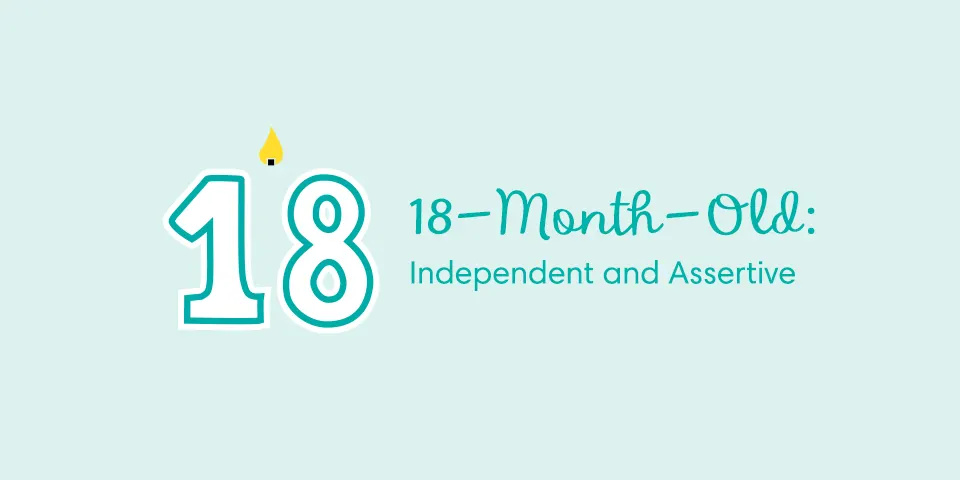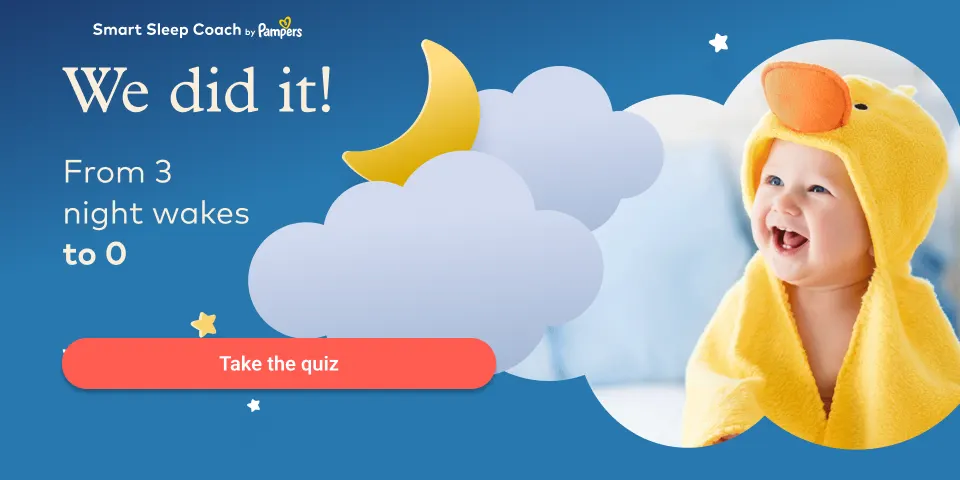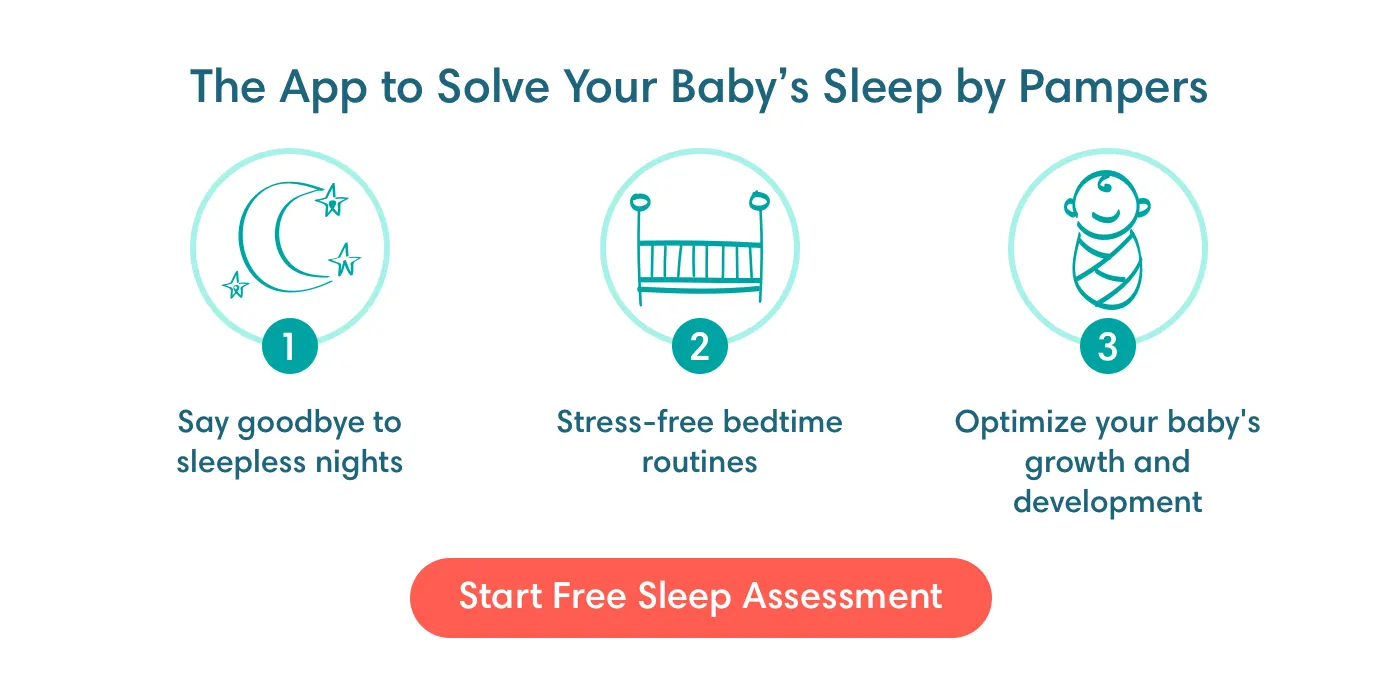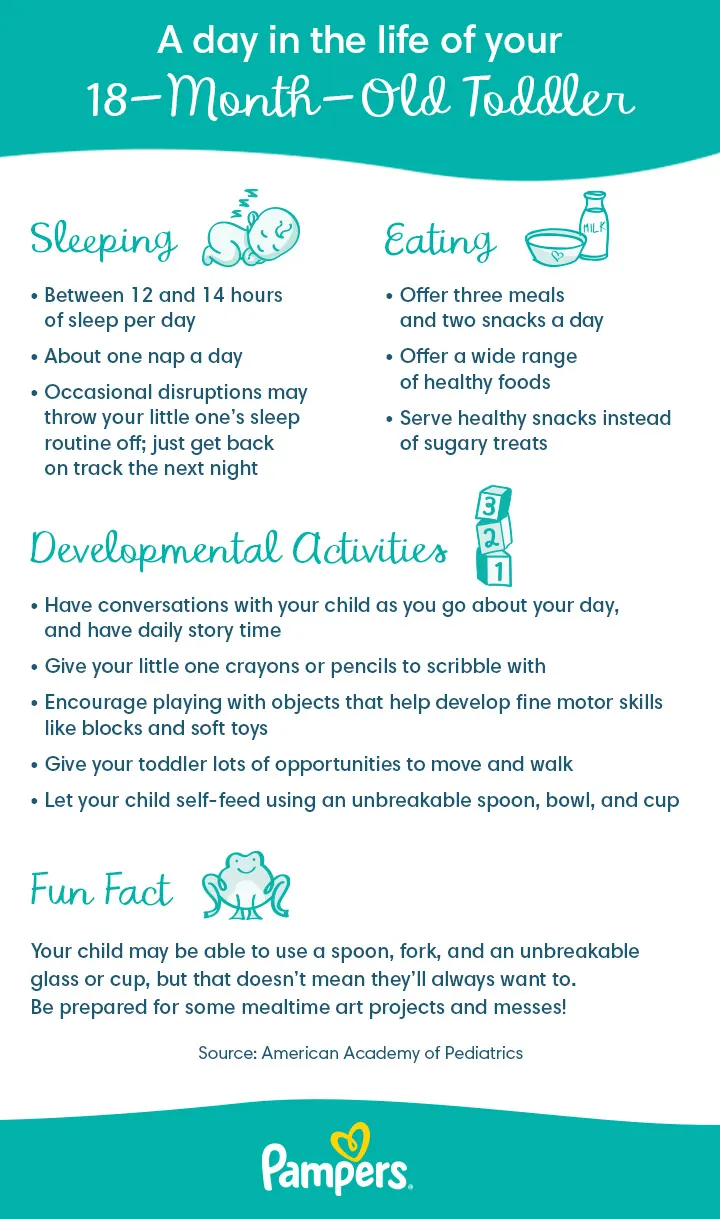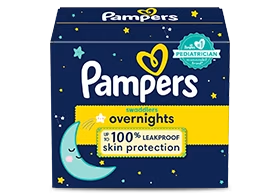18-Month-Old: Confident and Independent
At 18 months old, your toddler is reaching new milestones, such as growing more independent. This new sense of self may translate into some stubbornness, and you might hear the word “no” a lot more often! You may also notice some improvement in walking, stairclimbing, and hand and finger coordination. Read on to learn more about these 18-month-old developmental milestones and what else is in store as your child turns one and a half years old!
Toddler Development: 18-Month-Old Milestones
Every child is a unique individual, developing at their own rate, so your 18-month-old toddler may reach the following milestones either this month or a little earlier or later:
Declarations of independence. Around this time, your toddler may be getting more independent and assertive. As your little one gains confidence, they may start saying “no” when you ask them to do something. It may even become a new favourite word, so watch out!
Confident stair climbing. Up until this point, getting up and down stairs might have been tricky for your child, but it may be getting easier as they learn to climb stairs while holding onto the railing. Around this time, 18-month-olds may also be able to turn corners without falling. Still, it’s important to supervise your toddler when around stairs.
Increased self-awareness. At around 18 months old, your toddler may be more self-aware and even be able to say their own name, identify themself when peering into a mirror, and generally be more interested in self-care activities, like combing their hair. How exciting to see your little one starting to grow up in this way!
How to Support Your 18-Month-Old’s Development Milestones
These are many activities for 18-month-old toddlers that help support their development milestones, including the following:
Encourage activities that improve hand and finger skills. Around this time, your little one may pick up small objects and move them around with control. For example, they may be able to put the pieces of a wooden peg puzzle in place, scribble with a pencil, finger-paint, build basic towers with toy blocks, and more. Helpful activities for this milestone include doing arts and crafts with your 18-month-old. Not only will these activities boost fine motors skills, but they also encourage creative expression.
Play with your toddler. Try a game of hide and seek or toss or roll a ball back and forth. Your child may want to bring you a toy and tell you what to do with it; let them be the director. Toys for 18-month-olds don’t have to be expensive or specific. Given your child is at the stage where they will want to explore, keep an extra-close eye on your toddler and ensure your home is babyproofed.
Take your child on outings. Trips to the neighbourhood playground or park provide opportunities for your child to explore, play, and work off some of that infamous toddler energy! If you have more time, consider heading to a children's museum or the zoo. Even riding the escalator or a glass-enclosed elevator in a shopping mall or a hotel is entertaining for an 18-month-old.
Get ready for potty training. Typically, experts recommend potty training start after the second birthday, but some toddlers might be ready earlier. Read up on the signs of potty-training readiness. In the meantime, try saying the words “pee-pee” and “poop” when you change your little one’s diaper, and help them become familiar with the toilet or the potty.
Make up a story. Find a picture book to support your 18-month-old’s speech milestones. Ask questions about what they see: Are there any people? What are they doing? What kind of scenery is there? Have fun with it and get creative, as you and your toddler are on an imaginative journey! This activity also gives a big boost in language comprehension and vocabulary expansion. If your 18-month-old is not talking much yet but understands what you’re saying, this is a great way to encourage them to speak more.
Mealtimes and Menus for Your 18-Month-Old
You may be noticing that your toddler’s eating habits are quite unpredictable. One day, your little grazer may eat everything in sight, and the next, they may turn down anything you offer, even a favourite food. It might give you peace of mind to know that your toddler is not unique in this behaviour! Most toddlers around 18-months-old have fluctuations in how hungry they are depending on things like their level of activity that day, their metabolism, and whether they are in the middle of a growth spurt. Most 18-month-olds do well with three small meals and two snacks per day. Serve a variety of nutritious foods and let your child decide what and how much of it to eat. You'll find that over the course of a few days, their diet will naturally balance itself out to provide all the necessary nutrients.
Limiting Sweets
It’s natural for your little one to prefer sweets over other foods. You may have noticed when feeding your child baby foods, they gobbled up the sweet options, like carrots or sweet potatoes. Now that your baby is a toddler, they would most likely pick a cookie over a piece of cheese, if offered. As the parent, you are in control of the food served to your toddler, and it’s important to encourage healthy choices and limit the intake of sugary food. Even if your child refuses dinner, don’t give in with sweets just because they’re not eating.
18-Month-Old Sleep Schedule and Sleep Regression
At 18 months old, your toddler’s sleep schedule typically requires between 12 and 14 hours of sleep a day. Included in this number is one nap per day.
If your toddler is in daycare, the facility may have one or two nap times scheduled each day. You may want to check in with the daycare staff to find out how well your child is napping and ensure your 18-month-old’s sleep schedule isn’t disturbed too much. If you notice your little one is overtired when you pick them up from daycare, it could be because these nap times are not productive. Ask the staff what could be done to improve the situation and how to better coordinate your toddler's sleep routine at home and at the daycare facility. If you notice your 18-month-old experiencing any sleep regression, it could be a mix of over napping during the day and too much excitement on the mind. When children development new milestones and gain fun skills, they don’t always love pausing that excitement for naps or nightly sleeps!
A Day in the Life of Your Toddler
Here’s a snapshot of what your 1-and-a-half-year-old’s day might look like:
Your Toddler’s Health and Safety: In-Flight Safety
You might be planning to travel by plane with your toddler, whether it’s to visit family who live faraway or for a vacation. Here are some tips to take into consideration when flying with your child:
Alleviate ear pressure. Offer your child a pacifier to suck on during ascent and descent, which can help equalise the pressure in their ears and prevent discomfort.
Protect ears from noise. Think about protecting your child’s ears from cabin noise with small earplugs or cotton balls. Noise-cancelling headphones, if they can tolerate them on their head, can also work well.
Choose a window seat. Choose a seat closer to the window, as an aisle seat can put your child at risk of getting bumped by a food service cart or by someone walking in the aisle.
Be up to date on vaccines. Talk to your child’s healthcare provider and make sure any 18-month vaccines are finished before traveling. Read more about your baby’s immunization schedule.
Dress in layers. Dress your child in layers that are easy to remove, as the temperature on your flight can vary.
Plan for diaper changes. Consider a diaper change before you board the airplane and be sure to pack plenty of supplies in your diaper bag for the journey.
Provide entertainment. Bring items that can help occupy your 18-month-old’s attention, such as their favourite stuffed animal or blanket, books, and toys.
Do you know what the diaper bag essentials are? Take our quiz below to find out!
Your Life as an 18-Month-Old’s Parent: Setting a Good Example
Around this month, your toddler may be starting to imitate you more and more. Your child may see you talking on the phone and do the same with their toy phone, or they’ll try to drive their toy car after seeing you at the wheel. Since your 18-month-old’s inclination to imitate is so strong during this time, it’s a good idea to be on your best behaviour, too, so you can set a good example. Here are some ways to set a good example for your 18-month-old toddler:
Draw attention to good behaviour. When you and your friend or partner share something, point it out to your child. For example, say “Look, daddy is sharing his piece of cake with Mommy. That’s nice of him, isn’t it?”
Explain your emotions. If you’re feeling frustrated, explain to your child that you’re upset and then show them how you calm down. Maybe you take a few deep breaths or think of something that makes you feel happy.
Don’t hide feelings. Try to express your feelings, even if they do stem from frustration. These moments can teach your toddler that it’s OK to express their own feelings to you, too.
Praise good behaviour. Praise your child when they behave well. For example, tell them “Good job for putting all your toys in the toy box.”
FAQs AT A GLANCE
During this month, or sometime soon, your toddler may be able to do things like:
- Scribble and draw
- Follow simple verbal instructions
- Point to familiar objects
- Speak using simple phrases
- sort shapes and colours
Remember that every child develops at a unique pace, so there’s nothing set in stone regarding what an 18-month-old “should” be doing exactly, and your toddler may exhibit these milestones earlier or later.
Checklist for This Month
As you get excited for these 18-month-old milestones, get prepared with this short checklist regarding your child’s development:
Schedule the next well visit. Talk to your child’s healthcare provider and make sure you have the next appointment on the books. Eighteen months is an exciting time filled with many milestones, so your 18-month-old child’s appointment is an important one. At this visit, your child’s provider will check growth, do a physical exam, order any tests that may be needed, and give any immunizations. Your provider will go over common issues at this stage of development, which could include diet, discipline, and sleep. This is a good opportunity to raise any questions or concerns you have, so come prepared with a list so you don’t forget anything.
Schedule a trip to the dentist. If you haven’t already done so, schedule your toddler’s next dental visit. It’s a good idea to have regular checkups every six months, unless your child’s dentist or healthcare provider recommends otherwise. At the visit, the dentist will make sure your 18-month-old’s teeth are coming in and developing in a healthy way.
Start a scrapbook. As your toddler does more arts and crafts activities, like drawing, finger-painting, or simply scribbling with crayons or coloured pencils, it might be time to start a scrapbook to save some of their precious artwork.
Apply sunscreen. Check that you have enough sunscreen at home and, if not, add it to your shopping list for next time. You might go through quite a bit of sunscreen, as it’s important to apply whenever your child plays outside. A sunscreen of SPF 30 or more should be applied and then reapplied every two hours.
Remember to keep your toddler rear-facing in their car seat. Your child should be kept in a rear-facing car seat until 2 years of age, or when they reach the highest height or weight limit of the car seat.
Even with potty training potentially around the corner, those diaper changes don’t stop! Reward yourself for every purchase by downloading the Pampers Club App.
The information in this article is based on the expert advice found in trusted medical and government sources, such as the American Academy of Pediatrics and the American College of Obstetricians and Gynecologists. You can find a full list of sources used for this article below. The content on this page should not replace professional medical advice. Always consult medical professionals for full diagnosis and treatment.
18 Month Old- checklist
